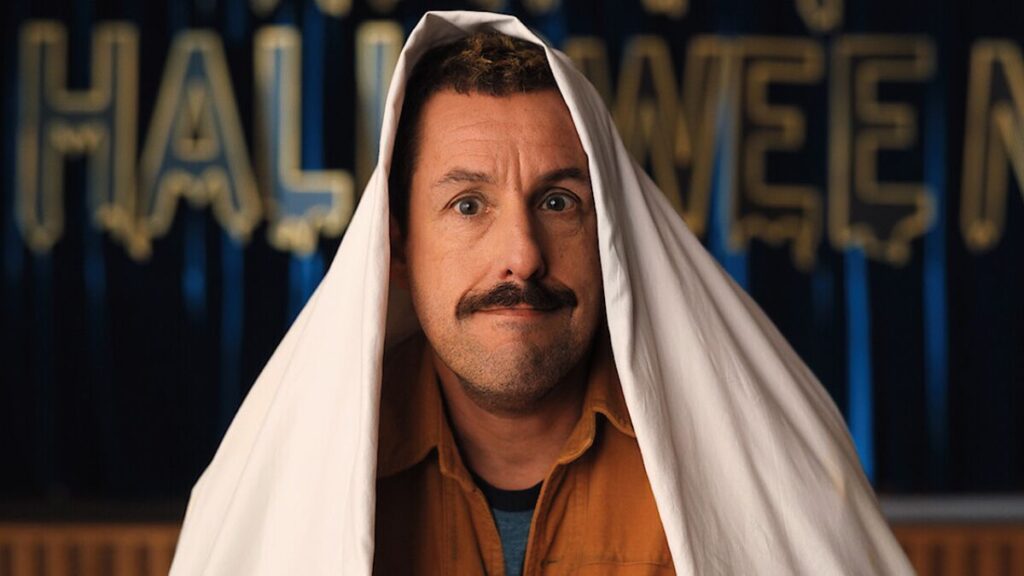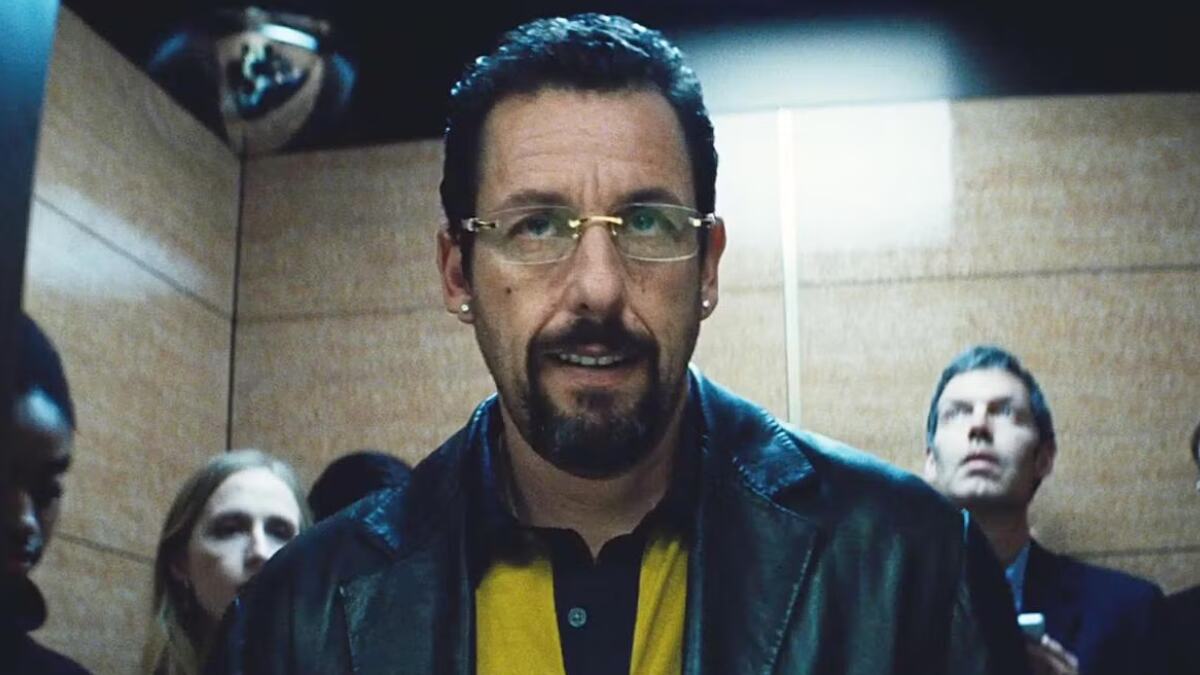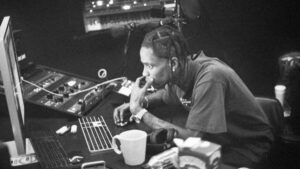Before Uncut Gems, Adam Sandler was Hollywood’s class clown — a box-office juggernaut known less for his acting chops and more for weaponized goofiness. He was the face of comfort comedy: the kind of performer you’d turn to after a bad day, not someone who’d drop you into a vortex of panic in a fluorescent-lit diamond district. For years, his name was shorthand for loud, lowbrow, and unapologetically silly. Critics wrote him off. Audiences stopped expecting surprises.
So when the Safdie brothers announced Sandler as the lead in their raw, anxiety-drenched thriller Uncut Gems, it wasn’t just unexpected — it was confusing. The man behind Grown Ups and Jack and Jill was suddenly channeling manic desperation and existential dread with the precision of a seasoned dramatic actor. Was this a prank? A stunt? Or had we all been underestimating him?
What unfolded wasn’t just a career pivot — it was an artistic detonation. Sandler’s performance as Howard Ratner, a reckless New York jeweler with a gambling addiction and a death wish, didn’t just silence the skeptics. It redefined him.
This is the story of how Uncut Gems almost didn’t happen — and how the film that nearly passed him by became the one that changed everything.
From Laugh Tracks to Long Odds — Why ‘Uncut Gems’ Was a Long Shot
A Script That Sat in the Dark
The Safdie brothers weren’t overnight sensations — they were gritty perfectionists carving out their place in a Hollywood that didn’t know where to file them. Uncut Gems was born in 2009, scribbled into life by Josh and Benny Safdie alongside frequent collaborator Ronald Bronstein. But for a full decade, it gathered dust.
Studios didn’t know what to make of it. The script was chaotic, abrasive, and defiantly uncommercial. Who would root for a manic, self-sabotaging diamond dealer obsessed with winning bets and dodging goons? Big names like Harvey Keitel and Sacha Baron Cohen were floated; financiers flinched. Even A24 — the indie studio now synonymous with audacious storytelling — didn’t jump in right away. The Safdies shot Good Time with Robert Pattinson first, partly to prove they could handle the kind of pressure Gems demanded.
But the script never changed to fit the system. It waited — stubborn, pulsing with anxiety — for the right moment and the right actor. For years, Hollywood said no. The Safdies just kept saying “not yet.”
Sandler Says No — Multiple Times
When the Safdies first approached Adam Sandler with Uncut Gems, he didn’t just say no — he didn’t get it. The chaos, the abrasive energy, the unlikable protagonist? It felt too far outside the wheelhouse that had made him a household name. His manager reportedly dismissed the pitch outright. To Sandler, it was an art film wrapped in static — and at the time, he was building an empire of comfort comedies that guaranteed eight-figure returns and loyal Netflix viewership. Why risk it?
In later interviews, Sandler admitted he “didn’t understand what they were talking about.” The Safdies were relatively unknown back then, and the script read like a panic attack. He wasn’t alone — his team worried a role like Howard Ratner could alienate the loyal fans who still loved him for Happy Gilmore and Big Daddy.
The irony? That same fear of volatility is what would later perform its edge. Sandler walked away. More than once. But the Safdies didn’t — and eventually, neither did he.
Casting Chaos, Indie Hustle — And How It Finally Came Together
The A24 Effect & Indie Film Economics
By the time Uncut Gems was finally ready to move, most traditional studios had long since passed. It was too loud, too weird, too bleak — exactly the kind of movie A24 had made its name embracing. Known for backing high-risk, high-reward projects like Moonlight and Hereditary, A24 wasn’t just a distributor; it was a tastemaker. Where others saw chaos, A24 saw electricity.
Their decision to finance and champion Uncut Gems gave the Safdie brothers more than money — it clouted them. Suddenly, a project once viewed as unmarketable had the full weight of the coolest studio in indie film behind it. That meant prestige festival slots, critical buzz, and a real shot at reshaping Adam Sandler’s public image.
This wasn’t just about box office projections. It was about belief — in the script, in the chaos, and in a vision the industry had overlooked for too long.
A Game of Rewrites and Recasts
The role of the NBA star in Uncut Gems was always essential — but figuring out who would fill those size-15 sneakers proved more complicated than anyone expected. Originally written for Amar’e Stoudemire, the script was tailored to his identity and heritage. When scheduling fell apart, the Safdies rewrote the part for Joel Embiid, but the NBA season interfered again. Time was ticking. Budgets were tightening. Rewrites stacked up like parlay slips.
Then came Kevin Garnett — retired, intimidating, and somehow perfect. He wasn’t just believable; he was electric. Garnett brought a towering presence that mirrored Howard Ratner’s manic energy. Despite having no acting background, he slid into the film’s rhythm like a seasoned pro, grounding scenes with a kind of raw authenticity even veteran actors can’t fake.
What started as a logistical scramble ended up as a stroke of chaotic genius. Garnett didn’t just fill the role — he became part of the film’s pulse.
Inside the Grit — How ‘Uncut Gems’ Reshaped Sandler’s Legacy
Method Chaos: Sandler Like You’ve Never Seen Him
Adam Sandler didn’t just play Howard Ratner — he lived inside him. From the second he put on that leather jacket and gold-rimmed glasses, Sandler vanished into a man so frenetic, flawed, and unrelenting that even his co-stars felt the tension bleed off-screen. “He was Howard from the moment he stepped on set,” said Josh Safdie in an interview. “We’d call a cut, but the energy wouldn’t stop.”
The set itself mirrored the character’s claustrophobic world — tight spaces, handheld cameras, overlapping dialogue. Sandler had to navigate not just the emotional volatility of the role, but also a kind of organized chaos that left no room for autopilot. In one scene, as Howard juggles debt collectors and business deals while prepping for an auction, Sandler’s heart rate reportedly skyrocketed. The intensity wasn’t faked — it was felt.
This wasn’t a man mugging for laughs or leaning into lazy catchphrases. This was a desperate hustler clawing through his downfall — and Sandler made it terrifyingly believable. For the first time in his career, people weren’t watching to laugh with him. They were holding their breath, waiting to see if he’d survive his own bad decisions.
Critics Stunned, Audiences Divided
When Uncut Gems hit theaters, the critical reaction was instant — and intense. Reviewers called it “a two-hour panic attack,” but meant it as praise. The New Yorker hailed it as “a masterpiece of stress,” while Rolling Stone declared Sandler’s performance “career-defining.” On Rotten Tomatoes, the film soared into the 90s. Critics couldn’t believe it: the guy from The Waterboy had just delivered one of the decade’s rawest performances.
But audiences? They weren’t so sure. Some walked out midway through. Others left the theater feeling exhausted, even angry. Viewers expecting another quirky Sandler comedy were blindsided by the film’s abrasive tone and relentless tension. On CinemaScore, it landed a middling C+ — a sign that mainstream audiences were reeling from the bait-and-switch.
And then came the Oscar snub. Despite near-universal acclaim, Sandler didn’t land a nomination. Fans and critics alike called foul. Even Sandler joked that he’d make another “really bad movie on purpose” as revenge.
Yet maybe the snub sealed the film’s legacy. It confirmed Uncut Gems wasn’t made to win trophies — it was made to shake people up. And whether you loved or loathed it, it did exactly that.
How Sandler Stacks Up Against His Comedy-Drama Peers
When comedic actors pivot into drama, it’s often framed as a rite of passage — a bid for artistic legitimacy. But not all transformations are created equal. Jim Carrey had already spent years tugging at darker threads beneath his manic energy before Eternal Sunshine confirmed he could break your heart. Robin Williams mastered that tonal tightrope decades earlier, morphing between Mrs. Doubtfire and Good Will Hunting with an emotional fluidity that felt effortless.
Adam Sandler, though, was different. His comedy brand wasn’t just goofy — it was aggressively unserious, often veering into parody. His shift into dramatic territory felt less like a natural evolution and more like a hard left turn off a burning freeway. And that’s partly why Uncut Gems hit so hard. It didn’t just show range — it obliterated the idea that he didn’t have it.
Steve Carell’s shift in Foxcatcher was unsettling, too, but it came from a foundation already built on subtlety (think The Office’s later seasons). Sandler’s pivot, by contrast, blindsided people — and that shock made it stick.
What each of these actors risked was audience comfort. But what Sandler gained was something rarer: redemption from his formula. He went from box-office sure thing to critical enigma, and in doing so, proved that the most unexpected turns are sometimes the most revealing.
The Film That Launched a New Phase of Sandler’s Career
A Netflix Deal Reinvented
Before Uncut Gems, Adam Sandler’s Netflix films were often dismissed as high-production-value romps — The Ridiculous 6 and Murder Mystery fit the mold of easy, low-stakes viewing. Sandler was a streaming king, yes, but he was playing it safe, leaning on his comedic brand to deliver guaranteed numbers. But after Uncut Gems, something shifted. Suddenly, Netflix’s partnership with Sandler took on new weight. The success of Uncut Gems reintroduced him to the world as a serious actor capable of much more and reshaped his career trajectory.

In the wake of his dramatic triumph, his Netflix projects started reflecting a broader range. Hustle (2022), a sports drama where Sandler played a basketball scout, saw strong critical acclaim. The film performed well on Netflix’s charts and was praised for Sandler’s subtlety and depth. The numbers speak volumes — Hustle hit the #1 spot in over 80 countries, proving that audiences weren’t just there for Sandler’s comedy anymore. He had reinvented himself, and Netflix was all in.
From Box Office Punchline to Auteur Collaborator
The success of Uncut Gems was a game-changer, opening doors to a new tier of filmmakers who saw in Sandler the potential for complex, layered roles. No longer just the goofy guy in Click, he was now the actor with an undeniable depth — one who could push boundaries in ways few expected. Directors like Noah Baumbach, known for his sharp, nuanced storytelling (Marriage Story), quickly took notice, and Sandler was cast in The Meyerowitz Stories (2017) alongside heavyweights like Dustin Hoffman.
The Safdie brothers, who reignited his career, weren’t the only ones eager to collaborate. Sandler’s name now appears on the short list for auteurs looking to ground their narratives with both authenticity and star power. Hollywood now sees him as a dynamic talent, not just a box-office punchline. As writer-director Noah Baumbach noted, Sandler has “this incredible ability to embody both comedy and deep, human drama,” making him one of the most interesting actors of his generation.
A Personal Reflection on ‘Uncut Gems’ and the Sandler I Never Expected
I’ll admit it: when I first sat down to watch Uncut Gems, I was skeptical. Adam Sandler? The same guy from Billy Madison and Happy Gilmore? A dramatic role? I half expected a comedic undercurrent to lurk beneath the chaos, a punchline hiding behind all that tension. But within the first five minutes, I realized I was wrong. Not just about the film, but about Sandler himself.
The moment that flipped everything was when Howard (Sandler) finally locks eyes with the opal, believing it will be his redemption ticket. His expression was pure desperation, raw and unfiltered. No jokes, no winking to the camera — just a man suffocating under the weight of his bad decisions. The scene hit hard. I wasn’t just watching a character; I was seeing a human unravel before me.
What struck me most was the energy. Uncut Gems doesn’t let you breathe. The camera’s frantic pace, the overlapping voices, the ceaseless tension — it mirrors Howard’s spiraling world. I was exhausted by the end, but in the best way. What Sandler did here wasn’t just a performance; it was an embodiment. I realized, this wasn’t just a career reinvention. This was a reinvention of what I thought Sandler was capable of, and I hadn’t seen anything like it before.
Legacy Sealed in Diamonds — Why ‘Uncut Gems’ Will Matter for Decades
Uncut Gems isn’t just a film — it’s becoming a cultural landmark. Initially hailed as a critical triumph, it’s now evolving into something even more profound: a cult obsession that doesn’t just fade into the annals of film history but keeps gathering new fans. The frenetic energy, the anxiety, and the chaotic brilliance that it delivered on-screen are now reverberating through every corner of social media.
Film Twitter has kept Uncut Gems alive, perpetually memeing its most iconic moments — from Howard’s final, heart-stopping decisions to his wild rants. It’s the kind of film that thrives on rewatchability, with new details emerging each time, and each viewing feels like a new experience. Fans dig deeper into its layers of desperation, ambition, and regret. The opal, now symbolic of fleeting chances, has become a touchstone in online conversations about bad decisions, ambition, and the American dream.
Years from now, Uncut Gems will be remembered not as a one-off, but as the film that pushed a comedian to his limits and captured a moment in modern cinema that resonated far beyond its initial run. It’s a chaotic, brilliant slice of storytelling that will continue to reverberate — forever immortalized in the minds of those brave enough to experience it.
The Gamble That Paid Off
In the end, Uncut Gems was more than a film — it was a gamble, one that rarely happened. A nearly-forgotten script, a reluctant comedian, and a risky vision that no one could quite see coming. But when it all came together, it exploded into something unforgettable. Adam Sandler, once confined to the realm of easy laughs, became a revelation — a man who showed that true artistry doesn’t come from playing it safe.
Sandler’s transformation wasn’t just about embracing drama; it was about embracing the chaos within himself. For the audience, Uncut Gems isn’t just a thriller. It’s an experience, an emotional rollercoaster that demands to be felt, not just watched.
So the next time you press play, do so with a new understanding. Because this is more than a film you’ll just watch — it’s one you’ll live.
Mohit Wagh is the co-founder of The Graval with over 10 years of experience in SEO and content strategy. He specializes in crafting data-driven, authoritative content that blends cultural insight with digital growth.





4 thoughts on “How ‘Uncut Gems’ Almost Didn’t Happen And Changed Adam Sandler’s Career Forever”